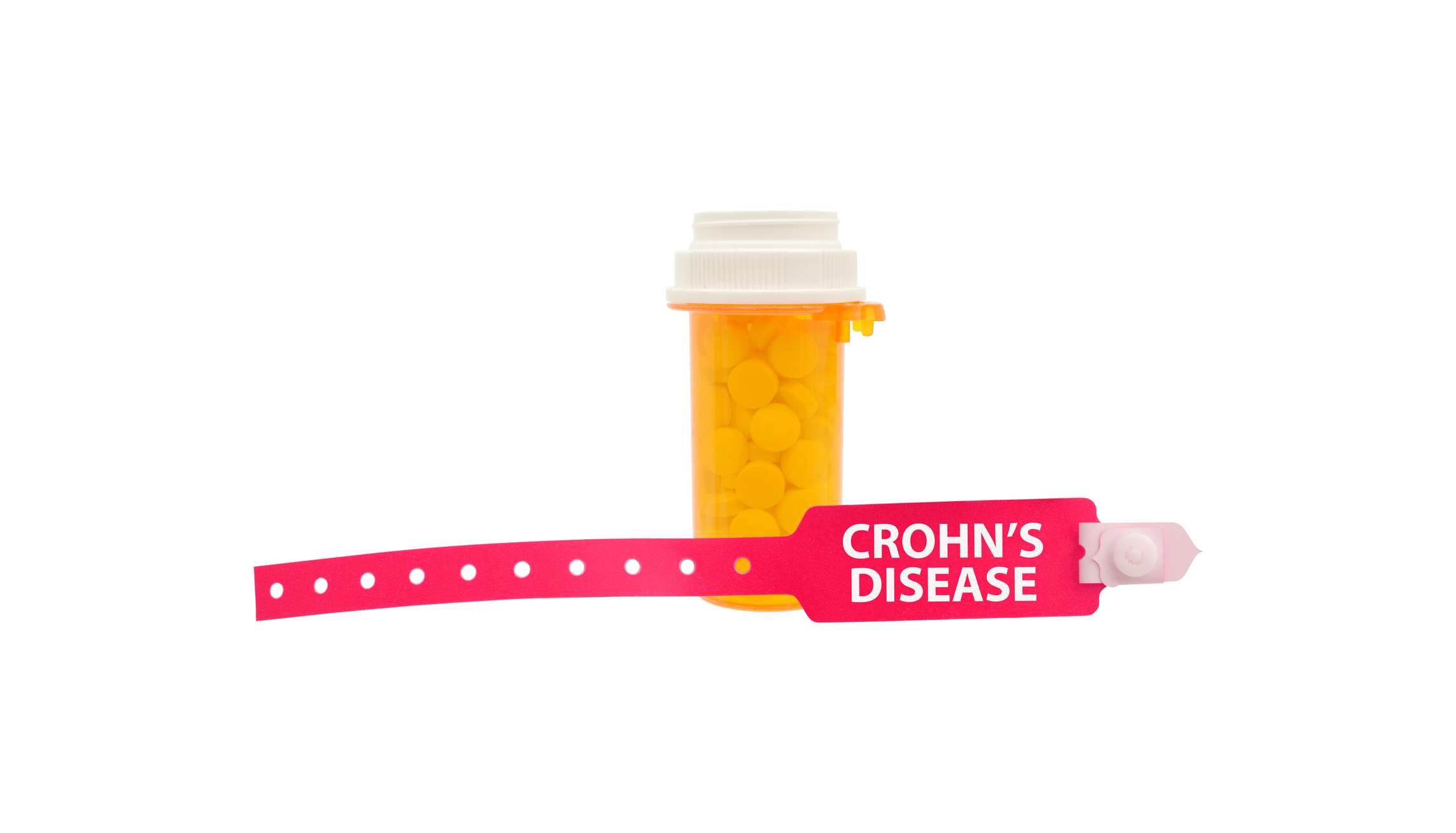User login
CHICAGO – As compared with prolonged use of corticosteroids, the use of anti–tumor necrosis factor (TNF) drugs was associated with reduced mortality in patients with Crohn’s disease, according to new findings presented here at Digestive Disease Week®.
The reduced mortality seen in this population may be secondary to the lower rates of major adverse cardiovascular events and hip fracture that are associated with anti-TNF use as compared to corticosteroid use. However, the same reduction in mortality risk was not observed in patients with ulcerative colitis using anti-TNF drugs.
Anti-TNF therapy has become a cornerstone in the management of inflammatory bowel disease (IBD), and Dr. Lewis noted that these agents have been shown to be useful for induction, maintenance, and remission, and to reduce surgical and hospitalization rates.
“However, fear of adverse events and cost has deterred greater use of these agents,” he told attendees.
In their study, Dr. Lewis and his colleagues compared the mortality risk with prolonged corticosteroids use versus anti-TNF drugs in patients with IBD.
They conducted a retrospective cohort study using data from 2006-2013 of a population of Medicaid and Medicare beneficiaries in the United States. The cohort included individuals who had received treatment with corticosteroids within the prior year and subsequently had been treated with either additional corticosteroid therapy for a total of greater than 3,000 mg of prednisone or equivalent within 12 months or newly initiated anti-TNF therapy.
The primary outcome of the study was all-cause mortality and secondary outcomes included common causes of death.
Dr. Lewis explained that 57 potential confounding variables were thought to be associated with the choice between corticosteroid use or anti-TNF therapy. These variables, which included demographic characteristics, medications, diagnostic tests, and comorbidities, were measured.
Among Crohn’s disease patients, 7,694 who were prolonged corticosteroid users and 1,879 were new to anti-TNF therapy. Among patients with ulcerative colitis, 3,224 were long-term corticosteroid users and 459 were new anti-TNF users.
The researchers found that the weighted annual incidences of death per 1,000 Crohn’s disease treated patients were 21.4 for those using anti-TNF therapy and 30.1 for those with prolonged corticosteroid use. For those with ulcerative colitis, these figures were 23.0 and 30.9, respectively.
The risk of death was statistically significantly reduced in Crohn’s disease patients who used anti-TNF therapy (odds ratio, 0.78; 95% confidence interval, 0.65-0.93). However, the benefit was not as pronounced in ulcerative colitis.
“We did not see the same effect for ulcerative colitis but for mortality, it was in the same direction, with a hazard ratio of 0.87,” he said.
Among the Crohn’s disease patients, anti-TNF therapy was associated with lower rates of major adverse cardiovascular events (OR, 0.68; 95% CI, 0.55-0.85) and hip fracture (OR, 0.5; 95% CI, 0.34-0.83), which were statistically significant. The use of anti-TNF therapy also reduced the risk of stroke in Crohn’s disease patients (OR, 0.72; 95% CI, 0.51-1.03), but there was also an increase in the risk of cancer (OR, 0.27; 95% CI, 0.98-1.65). Both of these findings nearly reached statistical significance.
In the model that censored for any of the secondary outcomes, the lower mortality risk was attenuated and very close to a null result (OR, 0.97; 95% CI 0.63-1.47).
Dr. Lewis also pointed out that in some of their models, the magnitude of benefit with anti-TNF therapy appears to be greatest in the patients with the most comorbidities.
Digestive Disease Week® is jointly sponsored by the American Association for the Study of Liver Diseases (AASLD), the American Gastroenterological Association (AGA) Institute, the American Society for Gastrointestinal Endoscopy (ASGE), and the Society for Surgery of the Alimentary Tract (SSAT).
Dr. Lewis has disclosed financial relationships with Takeda, Pfizer, Lilly, Gilead, Johnson and Johnson, Samsung Bioepis, AbbVie, and Dark Canyon Laboratories.
CHICAGO – As compared with prolonged use of corticosteroids, the use of anti–tumor necrosis factor (TNF) drugs was associated with reduced mortality in patients with Crohn’s disease, according to new findings presented here at Digestive Disease Week®.
The reduced mortality seen in this population may be secondary to the lower rates of major adverse cardiovascular events and hip fracture that are associated with anti-TNF use as compared to corticosteroid use. However, the same reduction in mortality risk was not observed in patients with ulcerative colitis using anti-TNF drugs.
Anti-TNF therapy has become a cornerstone in the management of inflammatory bowel disease (IBD), and Dr. Lewis noted that these agents have been shown to be useful for induction, maintenance, and remission, and to reduce surgical and hospitalization rates.
“However, fear of adverse events and cost has deterred greater use of these agents,” he told attendees.
In their study, Dr. Lewis and his colleagues compared the mortality risk with prolonged corticosteroids use versus anti-TNF drugs in patients with IBD.
They conducted a retrospective cohort study using data from 2006-2013 of a population of Medicaid and Medicare beneficiaries in the United States. The cohort included individuals who had received treatment with corticosteroids within the prior year and subsequently had been treated with either additional corticosteroid therapy for a total of greater than 3,000 mg of prednisone or equivalent within 12 months or newly initiated anti-TNF therapy.
The primary outcome of the study was all-cause mortality and secondary outcomes included common causes of death.
Dr. Lewis explained that 57 potential confounding variables were thought to be associated with the choice between corticosteroid use or anti-TNF therapy. These variables, which included demographic characteristics, medications, diagnostic tests, and comorbidities, were measured.
Among Crohn’s disease patients, 7,694 who were prolonged corticosteroid users and 1,879 were new to anti-TNF therapy. Among patients with ulcerative colitis, 3,224 were long-term corticosteroid users and 459 were new anti-TNF users.
The researchers found that the weighted annual incidences of death per 1,000 Crohn’s disease treated patients were 21.4 for those using anti-TNF therapy and 30.1 for those with prolonged corticosteroid use. For those with ulcerative colitis, these figures were 23.0 and 30.9, respectively.
The risk of death was statistically significantly reduced in Crohn’s disease patients who used anti-TNF therapy (odds ratio, 0.78; 95% confidence interval, 0.65-0.93). However, the benefit was not as pronounced in ulcerative colitis.
“We did not see the same effect for ulcerative colitis but for mortality, it was in the same direction, with a hazard ratio of 0.87,” he said.
Among the Crohn’s disease patients, anti-TNF therapy was associated with lower rates of major adverse cardiovascular events (OR, 0.68; 95% CI, 0.55-0.85) and hip fracture (OR, 0.5; 95% CI, 0.34-0.83), which were statistically significant. The use of anti-TNF therapy also reduced the risk of stroke in Crohn’s disease patients (OR, 0.72; 95% CI, 0.51-1.03), but there was also an increase in the risk of cancer (OR, 0.27; 95% CI, 0.98-1.65). Both of these findings nearly reached statistical significance.
In the model that censored for any of the secondary outcomes, the lower mortality risk was attenuated and very close to a null result (OR, 0.97; 95% CI 0.63-1.47).
Dr. Lewis also pointed out that in some of their models, the magnitude of benefit with anti-TNF therapy appears to be greatest in the patients with the most comorbidities.
Digestive Disease Week® is jointly sponsored by the American Association for the Study of Liver Diseases (AASLD), the American Gastroenterological Association (AGA) Institute, the American Society for Gastrointestinal Endoscopy (ASGE), and the Society for Surgery of the Alimentary Tract (SSAT).
Dr. Lewis has disclosed financial relationships with Takeda, Pfizer, Lilly, Gilead, Johnson and Johnson, Samsung Bioepis, AbbVie, and Dark Canyon Laboratories.
CHICAGO – As compared with prolonged use of corticosteroids, the use of anti–tumor necrosis factor (TNF) drugs was associated with reduced mortality in patients with Crohn’s disease, according to new findings presented here at Digestive Disease Week®.
The reduced mortality seen in this population may be secondary to the lower rates of major adverse cardiovascular events and hip fracture that are associated with anti-TNF use as compared to corticosteroid use. However, the same reduction in mortality risk was not observed in patients with ulcerative colitis using anti-TNF drugs.
Anti-TNF therapy has become a cornerstone in the management of inflammatory bowel disease (IBD), and Dr. Lewis noted that these agents have been shown to be useful for induction, maintenance, and remission, and to reduce surgical and hospitalization rates.
“However, fear of adverse events and cost has deterred greater use of these agents,” he told attendees.
In their study, Dr. Lewis and his colleagues compared the mortality risk with prolonged corticosteroids use versus anti-TNF drugs in patients with IBD.
They conducted a retrospective cohort study using data from 2006-2013 of a population of Medicaid and Medicare beneficiaries in the United States. The cohort included individuals who had received treatment with corticosteroids within the prior year and subsequently had been treated with either additional corticosteroid therapy for a total of greater than 3,000 mg of prednisone or equivalent within 12 months or newly initiated anti-TNF therapy.
The primary outcome of the study was all-cause mortality and secondary outcomes included common causes of death.
Dr. Lewis explained that 57 potential confounding variables were thought to be associated with the choice between corticosteroid use or anti-TNF therapy. These variables, which included demographic characteristics, medications, diagnostic tests, and comorbidities, were measured.
Among Crohn’s disease patients, 7,694 who were prolonged corticosteroid users and 1,879 were new to anti-TNF therapy. Among patients with ulcerative colitis, 3,224 were long-term corticosteroid users and 459 were new anti-TNF users.
The researchers found that the weighted annual incidences of death per 1,000 Crohn’s disease treated patients were 21.4 for those using anti-TNF therapy and 30.1 for those with prolonged corticosteroid use. For those with ulcerative colitis, these figures were 23.0 and 30.9, respectively.
The risk of death was statistically significantly reduced in Crohn’s disease patients who used anti-TNF therapy (odds ratio, 0.78; 95% confidence interval, 0.65-0.93). However, the benefit was not as pronounced in ulcerative colitis.
“We did not see the same effect for ulcerative colitis but for mortality, it was in the same direction, with a hazard ratio of 0.87,” he said.
Among the Crohn’s disease patients, anti-TNF therapy was associated with lower rates of major adverse cardiovascular events (OR, 0.68; 95% CI, 0.55-0.85) and hip fracture (OR, 0.5; 95% CI, 0.34-0.83), which were statistically significant. The use of anti-TNF therapy also reduced the risk of stroke in Crohn’s disease patients (OR, 0.72; 95% CI, 0.51-1.03), but there was also an increase in the risk of cancer (OR, 0.27; 95% CI, 0.98-1.65). Both of these findings nearly reached statistical significance.
In the model that censored for any of the secondary outcomes, the lower mortality risk was attenuated and very close to a null result (OR, 0.97; 95% CI 0.63-1.47).
Dr. Lewis also pointed out that in some of their models, the magnitude of benefit with anti-TNF therapy appears to be greatest in the patients with the most comorbidities.
Digestive Disease Week® is jointly sponsored by the American Association for the Study of Liver Diseases (AASLD), the American Gastroenterological Association (AGA) Institute, the American Society for Gastrointestinal Endoscopy (ASGE), and the Society for Surgery of the Alimentary Tract (SSAT).
Dr. Lewis has disclosed financial relationships with Takeda, Pfizer, Lilly, Gilead, Johnson and Johnson, Samsung Bioepis, AbbVie, and Dark Canyon Laboratories.
AT DDW
Key clinical point:
Major finding: Anti-TNF drugs were associated with reduced mortality in patients with Crohn’s disease (OR, 0.78) but to a much lesser extent in ulcerative colitis (OR, 0.87).
Data source: Database of Medicare and Medicaid recipients with 9,573 patients with Crohn’s disease and 3,683 with ulcerative colitis.
Disclosures: Dr. Lewis has disclosed financial relationships with Takeda, Pfizer, Lilly, Gilead, Johnson and Johnson, Samsung Bioepis, AbbVie, and Dark Canyon Laboratories.

